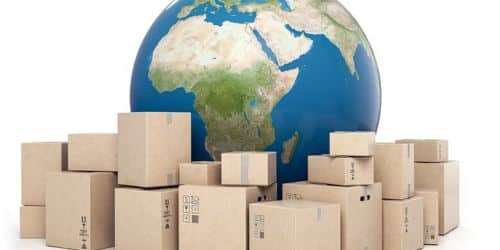Navigating the intricacies of export compliance in the Middle East and Africa can be a daunting task for businesses trying to establish a foothold in these dynamic markets. From understanding trade agreements and customs requirements to managing export control regulations, reducing risks and penalties, streamlining documentation and record-keeping, overcoming language barriers and cultural differences, and leveraging local expertise and partnerships, it’s easy to see how complex the process can become.
But don’t fret – this is where Exporter of Record (EOR) services come into play. By partnering with an experienced EOR service provider, you’ll be better equipped to navigate these complexities with ease. In this article, we’ll explore the benefits of utilizing EOR services when exporting goods to the Middle East and Africa. We will delve into how they help you manage export control regulations while reducing risks and penalties associated with non-compliance.
Additionally, we’ll discuss how EOR services streamline documentation processes by overcoming language barriers and cultural differences while leveraging local expertise through strategic partnerships that allow your business to focus on core activities without being bogged down by intricate compliance issues. Stay tuned as we guide you through the ins and outs of effectively navigating export compliance in these unique regions using EOR services as your secret weapon!
Understanding Trade Agreements and Customs Requirements
You know how crucial it is to grasp the ins and outs of trade agreements and customs requirements, but this tangled web can leave you feeling overwhelmed and uncertain about where to begin. The first step in navigating these complexities is gaining a deep understanding of the various trade agreements that exist between countries in the Middle East and Africa (MEA) region.
With many bilateral and regional trade agreements in place, such as the Greater Arab Free Trade Area (GAFTA) or the African Continental Free Trade Agreement (AfCFTA), businesses must be knowledgeable about relevant tariff reductions, market access provisions, rules of origin criteria, and any other specific terms that might impact their export activities. In addition to familiarizing yourself with applicable trade agreements, it’s essential to have a strong grasp on customs requirements for your target markets.
Customs duties, taxes, valuation methods, documentation standards – each country may have different regulations governing imports and exports. Thoroughly researching national customs authorities’ websites for information on import/export procedures can help ensure compliance with local rules.
Additionally, seeking guidance from experienced professionals like customs brokers or logistics providers can ease this learning curve by providing expert support tailored specifically to your business operations. Compliance with trade agreements and customs requirements is just one piece of the puzzle when it comes to successfully exporting products in the MEA region.
Another significant challenge lies in managing export control regulations – ensuring that your goods don’t fall under restricted categories or face penalties due to non-compliance with international sanctions.
By developing an effective export compliance program that includes proper classification of goods, obtaining necessary licenses if required, and screening parties involved in transactions against sanctioned lists, you’ll be well-prepared for this aspect of doing business overseas. In our next section on ‘managing export control regulations,’ we will delve deeper into these crucial considerations for successful trading across borders within MEA countries.
Managing Export Control Regulations
It’s essential to understand that managing export control regulations can be quite challenging, especially considering that 330% of all global trade is subject to trade controls and compliance measures. Export control regulations are a critical component of international business, as they help maintain national security and protect sensitive information and technologies.
As an exporter in the Middle East and Africa, you must be well-versed in the various export control laws governing your products and services to ensure smooth transactions and avoid potential penalties. To effectively navigate these complex regulations, consider the following crucial aspects:
- Know your product classification: Accurately classifying your products or services under the appropriate export control regime is vital in determining what licenses or authorizations are required for exporting.
- Screen clients thoroughly: Conduct due diligence on your customers by screening them against restricted party lists from various government agencies. This helps prevent unauthorized exports to entities involved in terrorism, proliferation of weapons of mass destruction, or human rights abuses.
- Maintain accurate documentation: Keeping detailed records of your export transactions is not only necessary for customs requirements but also serves as evidence of compliance with export control regulations.
- Invest in training: Regularly train employees responsible for handling exports on the latest regulatory updates and best practices. This ensures that they have the knowledge needed to identify any potential risks associated with non-compliance.
By implementing these strategies when managing export control regulations in the Middle East and Africa, you demonstrate a commitment to maintaining a robust compliance program within your organization.
Not only does this contribute to building trust with regulators, but it also reduces delays caused by customs inspections or license applications. A strong focus on adhering to relevant export controls significantly diminishes potential risks associated with non-compliance and positions businesses for success within their respective industries. With these methods in place, you’ll be well-prepared for tackling future challenges related to reducing risks and penalties during international trade endeavors.
Reducing Risks and Penalties
By minimizing risks and penalties, you’re setting your organization up for success in the international trade arena. Export compliance is critical when dealing with the complex regulations governing exports to the Middle East and Africa. To ensure that your company remains compliant and avoids potential fines or other consequences, it’s essential to implement a robust export compliance program (ECP).
An ECP should include a proper screening of end-users, thorough classification of products under applicable export control laws, regular training of employees on relevant regulations, and ongoing monitoring of compliance. One effective way to reduce risks and penalties associated with non-compliance is by partnering with an experienced Exporter of Record (EOR) service provider.
EOR services can help navigate the complexities of export compliance in two primary ways: first, they can manage all aspects related to shipping documentation and ensure that all necessary permits are secured; secondly, they can assist in managing relationships with local customs authorities and regulatory agencies.
Engaging an EOR service provider ensures that your organization has access to expert advice on constantly evolving regulations in these regions while mitigating potential risks associated with non-compliance. A well-executed ECP not only safeguards against penalties but also streamlines processes within your organization.
As part of this program, maintaining accurate documentation and record-keeping is essential to demonstrating regulatory compliance during audits or inspections. In addition to facilitating internal efficiencies through organized data management systems, a comprehensive ECP supported by an experienced EOR service provider will allow you to focus more on expanding your business into new markets while ensuring adherence to regional import/export requirements across the Middle East and Africa. With this foundation in place, you’ll be better positioned to tackle the upcoming challenges related to streamlining documentation and record-keeping for long-term success.
Streamlining Documentation and Record-Keeping
Exporter of Record (EOR) services in the MEA region can be a game changer when it comes to simplifying the intricate world of international trade, especially in the dynamic regions of the Middle East and Africa. As an exporter or importer operating in these areas, compliance with numerous overwhelming regulations and requirements is crucial. By partnering with an EOR service provider in the MEA region, you gain access to their expertise in managing complex export compliance processes.
EOR services in the MEA region ensure the accuracy, completeness, and up-to-date status of all required documentation, helping you avoid delays, fines, or penalties resulting from non-compliance. Maintaining comprehensive records related to your shipments is a critical aspect that EOR services in the MEA region excel at. They assist in preparing essential documents such as commercial invoices, packing lists, certificates of origin, export licenses, and end-user statements, all of which are crucial components for ensuring smooth customs clearance processes across multiple jurisdictions.
With deep knowledge of local requirements for product classification under the Harmonized System (HS) codes or Export Control Classification Numbers (ECCN), EOR providers in the MEA region play a vital role in import/export duties and taxes calculations. By entrusting your export compliance responsibilities to a reliable EOR service provider in the MEA region, who effectively manages documentation and record-keeping activities on your behalf, you can better focus on other essential aspects of your business.
Additionally, the expert support teams of EOR providers in the MEA region are well-equipped to overcome language barriers and cultural differences. They understand local regulations and effectively communicate with authorities throughout the Middle East and Africa, making the process less daunting.
Overcoming Language Barriers and Cultural Differences
Imagine effortlessly bridging language gaps and embracing cultural nuances while conducting your international trade in the Middle East and Africa – that’s the advantage of partnering with an EOR service provider. As you navigate the complexities of export compliance in these regions, communication challenges can be daunting. But with a reliable partner who understands local languages, customs, and regulations, you’ll find it easier to maintain smooth trade operations.
- Empathy: Your EOR service provider will appreciate the unique challenges faced by businesses trading in diverse markets.
- Efficiency: With their extensive knowledge of local languages and cultures, they can streamline your communications with partners and regulators.
- Trust: Building relationships is key to successful business dealings in these regions; your EOR partner will help earn trust by respecting cultural norms.
- Adaptability: A knowledgeable EOR service provider is not only fluent in regional languages but also adaptable to different communication styles prevalent across countries.
- Growth: By overcoming language barriers and understanding cultural differences, you’ll unlock new opportunities for growth within these lucrative markets.
EOR services don’t just help with language translation; they also provide valuable insights into navigating complex regulatory environments and fostering strong business relationships rooted in mutual respect. This deep understanding of regional intricacies enables them to guide you through each step of the export process efficiently.
As we move on to explore how leveraging local expertise and partnerships can further enhance your export operations, remember that choosing a well-rounded EOR service provider is crucial for long-term success.
Leveraging Local Expertise and Partnerships
As you effectively overcome language barriers and cultural differences in your export compliance efforts in the Middle East and Africa, another crucial factor to consider is leveraging local expertise and partnerships. By tapping into the knowledge base of local experts, you can better navigate the complexities of export compliance regulations and requirements specific to these regions.
Collaborating with experienced partners who are well-versed in regional regulations provides invaluable insights into unique aspects of compliance such as customs procedures, documentation, licensing, and classification. These partners can also help identify potential risks or violations early on, enabling you to take corrective action before any issues escalate.
EOR (Exporter of Record) services offer a comprehensive approach by providing access to a network of local experts who ensure that your shipments comply with all necessary import and export laws. This enables you to focus on growing your business while leaving the intricacies of compliance management to professionals familiar with regional nuances.
Furthermore, establishing strong relationships with local authorities can streamline processes for obtaining permits or resolving disputes. Your EOR service provider will liaise directly with government agencies on your behalf, ensuring timely communication and adherence to all regulatory requirements – saving you time and reducing potential delays or penalties.
As your business grows within these complex markets, trust in your partner’s ability to provide expert guidance through ever-evolving legal landscapes becomes paramount. Next up is how engaging EOR services allows you more time for focusing on core business activities while they take care of regulatory complexities for you.
Focusing on Core Business Activities
By concentrating on your core business activities, you’re able to grow and expand while trusting that the regulatory aspects are being expertly managed by your EOR service provider. Export compliance in the Middle East and Africa can be a daunting task, especially considering the diverse regulations and requirements across different countries.
By partnering with an experienced EOR service provider, you will have access to their expertise in navigating these complexities, allowing you to focus on your company’s main objectives such as building relationships with clients and increasing revenue. An EOR service provider takes responsibility for ensuring that all export documentation is accurate and complete, including obtaining necessary licenses, permits, and certifications.
They also manage customs clearance processes, ensuring the timely delivery of goods without delays or penalties. This level of support allows you to dedicate your resources to other essential aspects of your business like product development, marketing strategies, and customer relations.
Additionally, an EOR service provider continuously monitors changes in export regulations within the region; this proactive approach helps mitigate risks associated with non-compliance. Partnering with an EOR service provider not only streamlines the export process but also provides peace of mind knowing that professionals are handling complex compliance matters on your behalf.
This strategic partnership enables you to concentrate on growing your business while minimizing potential disruptions caused by regulatory issues. Ultimately, entrusting these responsibilities to experts ensures seamless operations in international markets while freeing up valuable time for you to invest in developing new opportunities for growth within the Middle East and Africa regions.
Conclusion
As you navigate the intricate maze of export compliance in the Middle East and Africa, let EOR services be your guiding light. Picture yourself effortlessly clearing customs with expertly managed documentation. Confidently overcome language barriers and build strong local partnerships. Embrace the freedom to focus on your core business activities as you sail smoothly through these complex waters. Trust in EOR services to steer you toward success in this challenging but rewarding market.
- Employer of Record: Meaning, Services, Benefits & Difference
- 18 Most Expensive Dog Breeds in 2023 (Updated)
- The Top 20 Toy Companies in the World
- TAX ATTORNEY: When Do You Need a Tax Lawyer (+ Salary Structure)
- Mergers and Acquisitions in the Current Business Climate: Navigating the Opportunities
- AVERAGE MONTHLY INCOME: How to Calculate!!!
- MIDDLE CLASS: Meaning, Income Tax, and Guide






